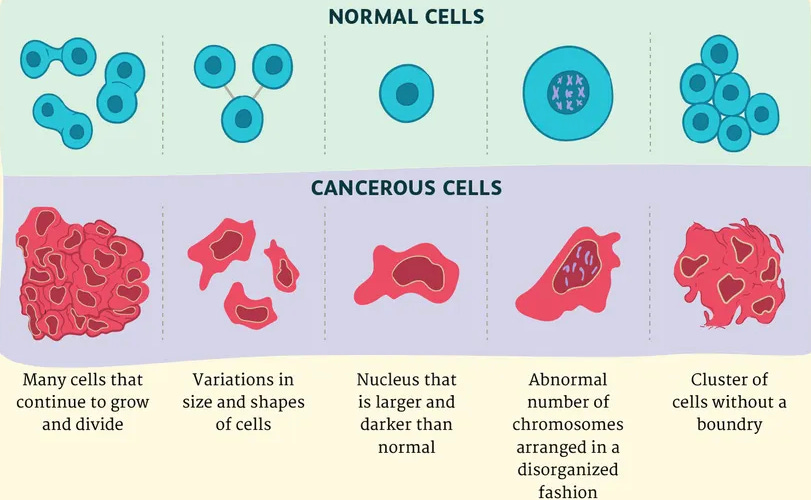Turmeric V Cancer, Round 1 - Apoptosis, TP53 and Cell Signalling.
Packing a George Foreman style knockout punch with just one spice!
In this article I want to break down these complicated terms into easy to understand language…

When we think about supporting cancer with supplements we may think of Vitamin D3 or Omega 3 fats, and there is this huge drive at the moment for Fenbendazole with Ivermectin (which I am going to write about in a few weeks).
But perhaps not so often do we hear about humble Turmeric.
Also known as Curcumin, due to its active ingredient of the same name, this beautiful, fragrant, golden spice is not only delicious but one of the most powerfully active, anti-inflammatory foods we have.
A gift from nature due to its ability to deepen the flavour of meals, evoking memories of travels to India, Morocco, Africa and Asia. It’s possible to include turmeric daily in our food or we can supplement (details at the end).
Turmeric is versatile and we may have heard that it’s a great medicine but how does it actually work? What does it actually do?

In last week’s article on Omega 3 fats and Cancer - The inflammation Problem I explained what you need to know about inflammation. I also shared a video of a presentation called Epigenetics and Inflammation where I explain what inflammation is and talked about some of the genes that can influence it. You may like to read that article or watch that video first, then hop on back over here to learn how turmeric can help you to fight cancer.
I am excited today to share with you that as well as reducing inflammation, turmeric does a whole lot more to help you in your fight against cancer than that.
Apoptosis
Turmeric does pretty much everything that Omega 3s are shown to do in the fight against cancer Click Here and it does so much more too. This includes inducing something called apoptosis. This is our regular kind of normal cell death that our cells stop doing when they become cancerous.
Once a cell reaches the end of its normal cycle, it has done the job that was intended, i.e. a liver cell that is supposed to help with detoxification for example. Then at the end of the life cycle, naturally it is time for destruction of the old cell, usually by apoptosis.

We need normal cell death to happen to continually rejuvenate our body. We replace almost every cell in our body around every seven years so this cell replacement needs to happen. Some cells are replaced faster than others, hair and nails for example are replaced much faster than bone cells.
Cancer cells multiply uncontrollably though, becoming tumours and they hide, evading apoptosis which means that they don’t die as they should and they keep on growing rapidly or proliferating. But we DO want cancer cells to go through the normal cell life/death cycle and we DO want them to end up dying by apoptosis, so how can we make that happen?
One very recent study showed that Turmeric induced apoptosis in breast cancers which many other studies have also shown before (1). Turmeric was also demonstrated to reduce tumour size and tumour growth in that same study. Tumeric made cancer cells spontaneously die in Pancreatic cancer in another research paper (2) and Turmeric also made prostate cancer cells die. Particularly interesting in this study where apoptosis was induced in prostate cancers which had adapted to be androgen blocker (drug) resistant, Turmeric not only induced apoptosis, it reduced overall tumour growth too. (3)

Tumour Suppressor Genes
Some of you may have heard of TP53. This gene is one of our biggest defences against cancer, like our own security Rottweiler. TP53 is known as a ‘Tumour Suppressor’ gene and it does what it says on the tin! It slows down the growth of tumours.

Turmeric speeds up TP53 (and TP53 slows down tumour growth, it takes a moment to get your head around it). Turmeric makes TP53 attack tumours more aggressively and we definitely want that to happen (2).
Interestingly enough as an aside, it’s important to be aware that Mould/Mold can deactivate our important TP53 Rottweiler so if you do have black mould in your house or have had a significant exposure to it in the past then I recommend you get a mycotoxin test to check if any of that mould took up residence in the body. The toxins that these moulds (called Aspergillus Niger for example and others) produce are both carcinogenic AND they shut down some of the body’s most important defences against cancer. If you want to test for these toxins then my clinic can provide this diagnostic and you can ask for yours by emailing us at admin@amandakingnd.com, (prices will depend on your location, we have to check with our labs). Or you can get that test from your own Naturopathic Doctor. It’s worth considering purchasing a good test with a comprehensive mycotoxin panel or an OAT test (organic acids test) to try ascertain if there could be a pathogenic mould triggering or keeping cancer going. OK back to the programme…
There are other tumour suppressor genes (of course, the body has back ups for back up plans - we are incredible beings). One is called RUNX3 and this was shown to be ‘markedly upregulated’ (made much faster) by Turmeric in a brain cancer called glioblastoma. (4) Taking turmeric is a bit like putting premium fuel in the tank, making it do double the work, but super efficiently!
It tastes great too, what’s not to love?

Cell Signalling
All normal cells have something called signalling pathways. These pathways allow cells to do things like ask for more ingredients to make a copy of itself and divide into two cells, then signalling allows those healthy daughter cells to grow and send their own signals to get more fuel for normal growth and eventually as we now know, reach a normal cell death (apoptosis).
In cancer, these signalling pathways are often damaged or disturbed and this can lead to uncontrolled cell growth and metastases, where parts of the cancer move and take up residence in other parts of the body.
Cancers need fuel to grow and to get that they send their own signals to ask the body to make feeding vessels through a process called angiogenesis. Some of these signals are what we call ‘growth factors’ with names like VEGF (vascular endothelial growth factor) and these tell the body to make more blood vessels. (5) If the body responds to that signal then angiogenesis starts to happen ‘angio’ means vessel (like blood vessel) and ‘genesis’ means the beginning of something. Angiogenesis generally happens in hypoxic conditions, meaning without oxygen. This is why if you are actively cancering, regular, moderate exercise is your lifestyle’s number one best friend.
This infographic shows normal cell division vs cancer cell division, a product of cell signalling.
Research has shown that Turmeric has a massive impact on cell signalling, including slowing down proliferation and stopping the tumour cells from making so many copies, making the cells die properly in apoptosis, it has been shown to prevent cancers from forming even when there was an exposure to carcinogens, or cancer causing compounds. (6), it was cited as ‘markedly inhibiting angiogenesis’ (7) and slowing down cancer metastases. (8)
I heard Turmeric isn’t well absorbed, what can I do?
It’s true that our bodies don’t absorb turmeric very well. Taken on its own, the spice will continue through the gut to be excreted with minimal medicinal impact, but there are ways to enhance the absorption without resorting to expensive supplements.
Taking turmeric along with a fat allows the body to absorb it best, if you also add in pepper then the active ingredient known as piperine, has a reaction with turmeric to even further enhance the bioavailability (how well the body can absorb the turmeric). What I love about this combination is that they are a great combination to get a delicious indian or asian foods. I gave you a recipe for a Tumeric Latte/Golden Milk yesterday, and I will share other turmeric recipes in other posts (I am out of space on this one).
Supplementing Turmeric
A therapeutic dose of turmeric is best in nano formulations as these are best absorbed (9) Speak with your Registered Health Care Provider about the right dose for you personally, knowing that safety has been demonstrated in research to date up to 8g daily (10) . I generally don’t offer more than 1-2g a day total, in clinic to patients but it depends, (to give context), so caution is advised and please always take professional advice before you take nutritional supplements.
Contraindications
Some Diarrhoea can be experienced at high doses (above 4g) (10) and there can be liver toxicity at higher doses or with long term use, so please make sure you only supplement under the care of a registered Health professional.
Next up - Round 2, Turmeric V Cancer - The Inflammation Solution!
Disclaimer
This information is provided for educational and informational purposes only and does not constitute the provision of medical advice or professional services. This information does not replace medical care or recommendations from a physician familiar with you, your health and laboratory data, or who is actively providing you with medical treatment. The information provided should not be used for diagnosing or treating a health problem or disease, and those seeking personal medical advice should consult with a licensed physician. Always seek the advice of your doctor or other qualified health provider regarding a medical condition.
All views shared and all copyright belongs to Empress Publications Ltd. All rights reserved.
References:
(1) Zhi-Dong Lv Liu, X.-P. Zhao, W.-J. et al. (2014). 'Curcumin induces apoptosis in breast cancer cells and inhibits tumor growth in vitro and in vivo', International Journal Of Clinical And Experimental Pathology, 7 (6), pp. 2818. [Online]. Available at: https://pmc.ncbi.nlm.nih.gov/articles/PMC4097278/.
(2) Demirci, Z. Islek, Z. Siginc, H.I. et al. (2024). 'Curcumin-loaded emulsome nanoparticles induces apoptosis through p53 signaling pathway in pancreatic cancer cell line PANC-1', Toxicology In Vitro, 102pp. 105958. [Online]. Available at: doi:https://doi.org/10.1016/j.tiv.2024.105958.
(3) Chen, C. Wang, Q. & Liu, J. (2025). 'Curcumin inhibits growth and triggers apoptosis in human castration-resistant prostate cancer cells via IGF-1/PI3K/Akt pathway', Journal Of International Medical Research, 53 (2). [Online]. Available at: doi:https://doi.org/10.1177/03000605231220807 (Accessed: 9 April 2025).
(4) Mashozhera, N.T. Chinreddy, S.R. Ranasinghe, Y.N. et al. (2025). Global Gene Expression Profiling Reveals Curcumin-Induced Molecular Mechanisms in U87 MG Glioblastoma Cells, [Online]. Available at: doi:https://doi.org/10.20944/preprints202503.2306.v1 (Accessed: 9 April 2025).
(5) Shaw, P. Kumar, S. Bhattacharya, R. et al. (2024). 'VEGF signaling: Role in angiogenesis and beyond', Biochimica Et Biophysica Acta. Reviews On Cancer/Biochimica Et Biophysica Acta, CR. Reviews On Cancer, 1879 (2), pp. 189079–189079. [Online]. Available at: doi:https://doi.org/10.1016/j.bbcan.2024.189079.
(6) Kunnumakkara, A.B. Anand, P. & Aggarwal, B.B. (2008). 'Curcumin inhibits proliferation, invasion, angiogenesis and metastasis of different cancers through interaction with multiple cell signaling proteins', Cancer Letters, 269 (2), pp. 199–225. [Online]. Available at: doi:https://doi.org/10.1016/j.canlet.2008.03.009.
(7) Guo, G.-X. Wu, K.-Y. Zhang, X.-Y. et al. (2023). 'The extract of Curcumae Longae Rhizoma suppresses angiogenesis via VEGF-induced PI3K/Akt-eNOS-NO pathway', Journal Of Ethnopharmacology, 308pp. 116299. [Online]. Available at: doi:https://doi.org/10.1016/j.jep.2023.116299.
(8) Yadav, L. & Upasana (2022). Golden Spice Turmeric and Its Health Benefits. [Online]. 8 April 2022. www.intechopen.com. Available at: https://www.intechopen.com/chapters/81170.
(9) Moballegh Nasery, M. Abadi, B. Poormoghadam, D. et al. (2020). 'Curcumin Delivery Mediated by Bio-Based Nanoparticles: A Review', Molecules, 25 (3), pp. 689. [Online]. Available at: doi:https://doi.org/10.3390/molecules25030689.
(10) Dhillon, N. Aggarwal, B.B. Newman, R.A. et al. (2008). 'Phase II trial of curcumin in patients with advanced pancreatic cancer', Clinical Cancer Research : An Official Journal Of The American Association For Cancer Research, 14 (14), pp. 4491–4499. [Online]. Available at: doi:https://doi.org/10.1158/1078-0432.CCR-08-0024.
(12)






Wow thanks for explaining this so well!! I am fighting stage 4 bc with bone mets and am on 2,000 mg of curcumin. I have read a lot of what is helpful but you have a gift of explaining the way it works so well. Thank you! I am kind of wanting to try the “milk” recipe. I am strict keto and my Gki has remained around 1 for over a month now, fighting cancer is tough! Thankful for great resources though, now I am adding your reads to my list!!
I grow tumeric in my garden. I usually just chop it fine and add it to what I am cooking with fresh ground pepper.